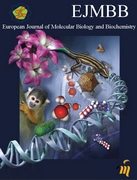Volume 11, Issue 1, 2024

Mcmed International
European journal of molecular biology and biochemistry
Issn
2348 - 2192 (Print),
2348 - 2206 (Online)
Frequency
bi-annual
Email
editorejmbb@mcmed.us
Journal Home page
http://mcmed.us/journal/ejmbb
Recommend to
Purchase












